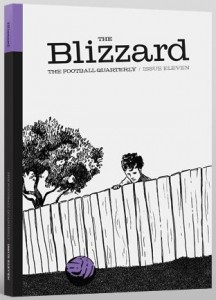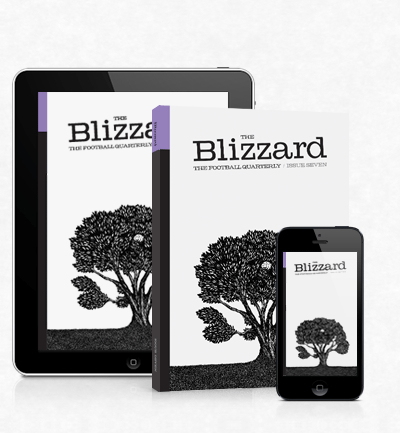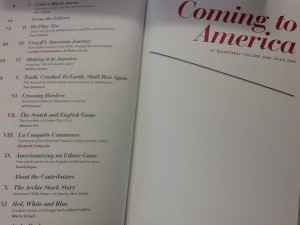 On December 5, Jonathan Wilson, journalist, author, and founding editor of The Blizzard, and the Football Scholars Forum convened for an online session devoted to independent fútbol writing in a digital age.
On December 5, Jonathan Wilson, journalist, author, and founding editor of The Blizzard, and the Football Scholars Forum convened for an online session devoted to independent fútbol writing in a digital age.
Wilson fielded a range of questions from an international audience from five continents. The 90-minute conversation blended English pragmatism and fútbol romantico, and indirectly grappled with Simon Kuper’s critique that “Football just isn’t what it’s cracked up to be,” and “anyone who peeks behind football’s curtain discovers there is no magic there.”
The Forum with Wilson pivoted around the notion that there is a growing English-speaking audience for longer-form writing about the game that goes beyond mixed-zone clichès, diatribes about managers, questionable refereeing decisions, and other narrow, shallow concerns of so much contemporary sport journalism. The challenges and opportunities of publishing in print and digital formats sparked conversation and debate, as did the evolving relationship between the futbology work of reporters and academics.
The audio recording of the session is available here.
For a Storify Twitter timeline click here, with special thanks to Liz Timbs (@tizlimbs).
Learn more about the Football Scholars Forum here.
Tag: The Blizzard
 Jonathan Wilson, journalist, author, and founding editor of The Blizzard, is the featured guest at the Football Scholars Forum on Thursday, December 5. Starting at 4pm Eastern (9pm GMT), the online football think tank will discuss the craft of independent fútbol writing in a digital age.
Jonathan Wilson, journalist, author, and founding editor of The Blizzard, is the featured guest at the Football Scholars Forum on Thursday, December 5. Starting at 4pm Eastern (9pm GMT), the online football think tank will discuss the craft of independent fútbol writing in a digital age.
Born in a pub after a Sunderland 4-0 demolition of Bolton in 2010, The Blizzard is a football quarterly that, Wilson says, is “neither magazine nor book, but somewhere in between.” It combines short- and long-form writing and is available in both analog and digital formats. The experience of independent English-language publications like The Blizzard and the recently defunct U.S.-based XI Quarterly, or Howler for that matter, suggests that journalists and scholars share many similar challenges and opportunities in publishing rigorously entertaining, meaningful football writing aimed at readers worldwide. [Click here to read my 2012 blog post on football at the intersection of academic research and popular journalism.]
Issue Nine of The Blizzard is being served up for Thursday’s session [download it here]. Its tasty menu includes: David Conn on the rise of Manchester, and Manchester City; Simon Kuper’s dissection of Barcelona tactics; Philippe Auclair interview with Michael Garcia, Fifa’s Ethics Committee chairman [sic!]; Gwendolyn Oxenham’s search for a pickup game in Teheran; and Igor Rabiner speaking with Lev Yashin’s widow.
To participate in the 90-minute session that takes place simultaneously at Michigan State University and online via Skype, please contact me asap (alegi.peter AT gmail.com) with your Skype name. Folks can also email or tweet me (@futbolprof) questions before the session.
 “Neither magazine nor book, but somewhere in between,” is how journalist and author Jonathan Wilson describes the genre of long-form football writing currently gaining popularity in the United States and Britain. I call this genre the bookzine, a hybrid form that lies at the intersection of academia and popular journalism.
“Neither magazine nor book, but somewhere in between,” is how journalist and author Jonathan Wilson describes the genre of long-form football writing currently gaining popularity in the United States and Britain. I call this genre the bookzine, a hybrid form that lies at the intersection of academia and popular journalism.
In an insightful article at Forbes.com, Zach Slaton notes how in September 2012 “three English-language print publications – XI Quarterly, The Blizzard, and Howler – either debuted or had their latest issue released all within a month of each other.” Each of the three magazines has a distinct style, edge, form, and funding model. Published in both print and digital editions, XI Quarterly and The Blizzard are more narrative and non-commercial than Howler, which emphasizes visual graphics and has a deal with Nike. “We’re embarking on a golden age for such writing,” Slaton writes, one “that may just be sustainable given the niches each one fills.”
The main triggers powering this new trend, according to Slaton, are “the globalization of the game and the tearing down of historical publishing structures.” He’s right, of course, as satellite and cable television, Web publishing, video and audio streaming online, Facebook, and Twitter expanded access for soccer junkies almost everywhere.
Having spent almost twenty years as a sort of football academic, I wonder why this supposed “golden era” is happening right now. Are there some deeper, longer-term factors fueling this sudden explosion of bookzines?